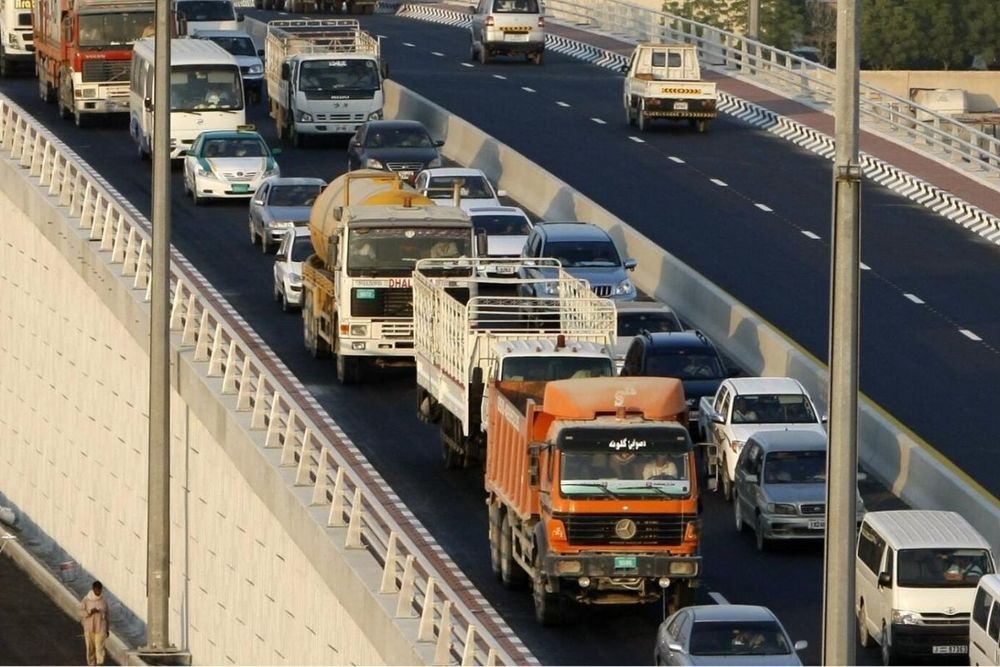Smart gates with high-resolution monitoring cameras will also be installed over the four-month period.
The maximum permissible weight of heavy vehicles that can ply along national roads is set at 65 tonnes by the UAE federal government to ensure road users' safety and protect road infrastructure's integrity.
The new federal law, announced on September 4, will take effect starting October 1 this year. However, heavy vehicle owners and companies will have a four-month grace period to adapt to the new law before administrative penalties come into enforcement beginning February 1, 2024.
During a press briefing on Wednesday, Suhail bin Mohammed Al Mazrouei, Minister of Energy and Infrastructure, underscored the law is aimed at improving the infrastructure, transport, and logistics sectors in the UAE. It will also boost the national economy and support the government's efforts to ensure the country's infrastructure is one of the world's safest and most technologically advanced.
Al Mazrouei added over 150,000 heavy vehicles will be covered by the law, including border-crossing trucks. Exempted from the law are heavy vehicles owned by security, military, police, and civil defence authorities.
Raising awareness
The MoEI minister noted that 28 percent of current truckloads across the country exceed 65 tonnes. The four-month grace period from October 2023 to February 2024 will be used to raise awareness of the law among transport companies.
During the same period, the UAE cabinet will also issue a decision specifying the permissible maximum total and axle weights, charts of dimensions, a list of violations, and administrative penalties, Al Mazrouei added.
Smart gates on UAE national roads will also be installed over the four-month period. These e-gates will have high-resolution monitoring cameras (with proven 98% accuracy), 3D laser scanners, and electronic sensors.
The full implementation of the law with corresponding penalties for violators will come into effect by February 1, 2024. Furthermore, an evaluation of the law's impact during its first year of implementation will be carried out by December 2024.
Restrictions in each emirate
Al Mazrouei also clarified that each emirate can put some restrictions depending on specific road conditions and what each local authority deems necessary.
A case in point is the regulation put in place by the Integrated Transport Centre (ITC) Abu Dhabi along Tahnoun bin Mohammed Road (Dubai - Al Ain E66), where the permitted weight for heavy vehicles is set at 45 tonnes. The ITC announced in March this year that trucks will be fined for non-compliance with the Freight Transport Regulation in Abu Dhabi while crossing smart gates.
"There is flexibility in each emirate,"
Al Mazrouei said,
adding aside from the federal limit, each emirate can put restrictions as per their requirements, with the safety of all road users, including truck drivers, other motorists and pedestrians as the main guiding principle. Each emirate or authority can set the limit below 65 tonnes and not more than that."
Road safety engineering
Meanwhile, Thomas Edelmann, founder and managing director of RoadSafetyUAE, praised the introduction of federal law. He said:
"One of the four E's in road safety stands for engineering (enforcement, education and evaluation are the other E's). This means a safe road infrastructure since the weight of vehicles plays an important role in the wear and tear of the road infrastructure."
"The UAE is regarded as having one of the safest and best road infrastructures in the world. To maintain this infrastructure, both from a technical and a financial standpoint, it is important to keep the infrastructure in good working condition as long as possible. Less maintenance means cost benefits and available budgets can be used further to increase the quality and number of other infrastructure projects. Hence, from a road safety perspective, it is desirable to have the best road infrastructure possible, and as a consequence, we appreciate the move to a lower-weight regime in the UAE,"
he added.
The heavier the vehicle, the more work the brakes must do to stop it. Here are some road fatalities and injuries involving trucks.
- August 11, 2023 – Two men died and two others were severely injured in a horrific traffic accident involving a pickup and a truck on Sheikh Mohammed Bin Zayed Road in Dubai.
- January 25, 2023 – A driver was seriously injured after a truck flipped on Yabsa Street in Sakamkam, Fujairah
- October 27, 2022 - One driver died and five others were injured in a multi-vehicle accident caused by tailgating, involving two trucks and four other vehicles on Sheikh Mohammed bin Zayed Road.
Facts and figures
- 28% - of current truck loads in the UAE exceed 65 tonnes
- Dh22 billion – worth of investments in UAE roads
- Dh200 million – the cost of annual UAE road maintenance
News Source: Khaleej Times









